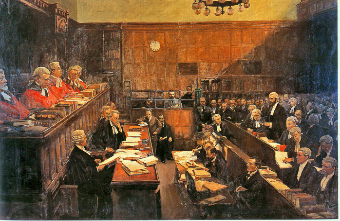 Years ago I had the opportunity to watch oral argument in a contract case in the Court of Appeals in London. The argument went on all morning. Then the judges broke for lunch and announced their intent to return for the afternoon session . . . in the same case. The barristers had not prepared written briefs prior to oral argument, and the judges were only casually familiar with the case before commencing the morning session. As each barrister orally cited a reported opinion, one of the judges would make a remark like “oh yes I remember that opinion, isn’t that the case in which. . . .” while the court personnel ran up and down ladders in the courtroom pulling books off of the shelves and placing them before the judges. (I do hope they now have computers.)
Years ago I had the opportunity to watch oral argument in a contract case in the Court of Appeals in London. The argument went on all morning. Then the judges broke for lunch and announced their intent to return for the afternoon session . . . in the same case. The barristers had not prepared written briefs prior to oral argument, and the judges were only casually familiar with the case before commencing the morning session. As each barrister orally cited a reported opinion, one of the judges would make a remark like “oh yes I remember that opinion, isn’t that the case in which. . . .” while the court personnel ran up and down ladders in the courtroom pulling books off of the shelves and placing them before the judges. (I do hope they now have computers.)
Prior to oral argument, the judges had not seen anything like what we would call a “brief.” In fact, the very word “brief” in English practice means a document or series of documents prepared by the solicitor for the barrister to use in arguing his case. The court never sees the “brief.”
I have since learned that this was once the practice in American appeals courts as well. Initially, the United States Supreme Court did not require written briefs. In 1821, it first required the filing of briefs, which were to contain “the substance of all material pleadings, facts, documents, on which the parties rely, and the points of law and fact intended to be presented at the argument.” 19 U.S. Reports (6 Wheat.). In December 1854, the Supreme court heard three forfeiture cases. The Attorney General filed a seven-page brief in the first. In each of the latter two, he filed a one-page brief referring the Court to the first. In 1884, the Supreme Court mandated for the first time that briefs include legal arguments. Over time, it gradually reduced the time allotted for oral argument.
The use of written briefs has made appellate courts far more efficient. American appellate judges dispose of many more appeals than their predecessors or their British counterparts, and they often do so without any oral argument. Although the Pennsylvania Superior Court allows oral argument as a matter of right, the Third Circuit granted oral argument in only 15.8% of cases in 2009.
Even in those courts, such as the Pennsylvania Superior Court, that permit oral argument as a matter of right, it is so short— either five or 15 minutes—that most appeals are decided before counsel even open their mouths.
A brief is the key to winning an appeal. It is essential that it be prepared in a competent and professional manner.

Recent Comments